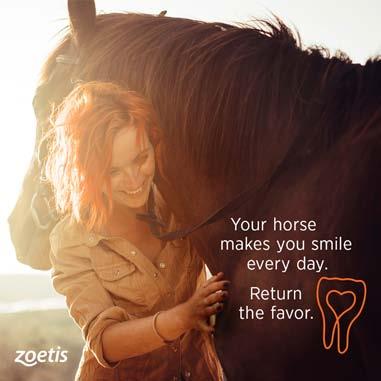
2 minute read
DENTAL EXAMS Teeth and Behavior
Annual Dental Exams Help Keep Horses On Their
Best Behavior
Advertisement
Identify Important Behavioral Signs With The Zoetis Equine Dental Wellness Survey
By Jeff Hall, DVM, Senior Equine Technical Services
Veterinarian, Zoe�s
A recent study published in the Journal of Equine Veterinary Science established a link between common equine behavior problems and abscessed cheek teeth. Periapical infections or abscessed cheek teeth are common in horses1 and will usually induce pain that is displayed in your horse’s behavior. According to the research, half of the cases of periapical infections were diagnosed during routine dental examinations, indicating that horse owners were unaware of the as sociation between undesirable behavioral patterns of their horses and dental pain.
Could dental pain be the culprit for your horse’s behavioral problems?

42 www.EliteEquestrianMagazine.com E E Common behavioral signs associated with cheek teeth abscesses fall into three main categories. Some signs include: • Eating slowly or taking frequent pauses while eating hay • Turning his head while eating or dropping hay or grain from his mouth • Dipping hay in water or avoiding drinking cold water • Evading the bit • Headshaking, lolling tongue or open- ing his mouth when ridden and/or driven with a bit • Rein contact worse on one side of the mouth • Resistance to bridling • Withdrawn, intense stare, aggressive behavior or self-harm to his head • Avoiding social interaction with other horses and people • Bad-smelling breath • Poor performance, such as a decline in athletic ability To help you identify behavioral signs associated with den tal abnormalities in your horse, Zoetis created an equine dental wellness survey. This short survey will help you recognize many of the eating, drinking, bit-related and general behavioral signs that your horse may be displaying due to a tooth abscess. Visit our web site, right to find the survey. EQUINE Health Zoetis is committed to educating horse owners about the importance of annual dental examinations and care by an equine veterinarian. Behavioral signs caused by dental abnormalities are crucial to identify. Recognizing these potential behavioral changes can help with earlier diagnosis, treatment and improved health and wellness for your horse.
Schedule dental examinations to ensure your horse’s health, wellness and behavior are all in check.
General Behavioral Problems Linked to Tooth Pain Eating and Drinking Bit-Related Take the Zoetis Equine Dental Wellness Survey
������������������������������������������������������������������ ����������������������������������������������������������������� ������������������������������������������������������������������ ������������������������������������������������������������������� �������������������������������������������������������������������� ������������������������������������������������������������������������ �������������������������������������������������������������� ������������������������������������������������������������������� ����������������������������������������������������������������� ������������������������������������������������������
www.zoetisus.com.
About Zoetis If your horse is expressing any of these behavioral signs, work with your equine veterinarian to conduct an oral and dental examination. Annual oral and dental examinations is a recommended baseline of care of your horse. Depending on your horse’s age, level of performance and overall condition of the teeth, additional examinations throughout the year may be needed.











